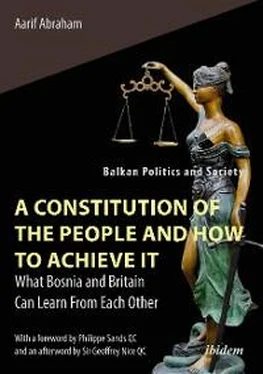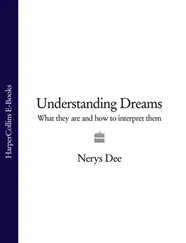This book seeks to contrast the two very different models of constitutional design in Britain and Bosnia. They sit at very different ends of a spectrum. The comparison goes to the heart of what a constitution is understood to be. Is it imbued with meaning, culture and history and, as such, is the soul of a State and its people? Or is it merely a functional, abstract and prescriptive set of rules which create the practical environment in which the people go about their everyday business?
In Bosnia, abstract and prescriptive constitutional rules have real world consequences. The Bosnian constitution has maintained and reinforced ethnic division and led to governmental deadlock. There are critical aspects of the constitution that require reform and there has been no shortage of proposals for reform. 7All reform proposals since 2005 to amend the Bosnian constitution, however, have been driven by political elites and have failed. These failures are to the immense detriment of individual human rights, 8and amount to at a colossal economic cost to the electorate. Up to 55 per cent of the entire State budget, 9some 3 per cent of the country’s GDP, is spent on government administration, largely as a result of Bosnia’s highly complex system of government (PIC 2020). By comparison, the cost of the Britain’s central government administration is approximately 1.36 per cent of the State budget, some 0.5 per cent of the country’s GDP. 10
Why has reform not succeeded? As this book will seek to show, efforts have been impeded by intransigent, narrow, and nationalist positions adopted by the political representatives of Bosnia’s three official ‘constituent peoples’: Bosniaks (Muslims), Bosnian Croats (Catholic Christians) and Bosnian Serbs (Orthodox Christians). These representatives sit in a number of constitutionally created institutions: the Parliamentary Assembly, the State Presidency and the two federal entities of Bosnia (Republika Srpska and the Federation). Intransigence is made possible due to vetoes, strict ethnic quotas and decentralised powers accorded exclusively to the three constituent peoples, all at the expense of such individuals or groups as are not specifically recognised by the Bosnian constitution. The constitution collectively and dismissively describes, although does not define, those not falling withing the three constituent groups as “Others” or “Citizens”. Others loosely comprise those identifying as “Bosnians and Herzegovinians” or those refusing to politically affiliate with any of the three constituent groups and the corresponding ethno-national political parties.
The Bosnian constitution was premised on the notion that the people, harbouring ‘ancient hatreds’, are divided, meaning that it is preferrable to leave decision-making in the hands of political elites. 11Meanwhile, experts warn about the latent desire of political elites for renewed armed conflict. In the international arena, powerful countries like Russia, China and Turkey are pursuing their own narrow self-interests in the Balkans and this has exacerbated local ethno-national competition. The economic and political manoeuvring of these powers demonstrates their intention to rescind the international communities’ guarantee to maintain the peace in Bosnia. In the domestic arena, ethno-nationalist elites in Bosnia are vying with each other for support in their secessionist ambitions by appealing to predatory neighbours, namely Croatia and Serbia. These international and domestic pressures are compounded by US dis-engagement from the region over the past decade. This has created a power vacuum in the region for other international actors to fill.
In Britain, the constitutional arrangements seem to have worked relatively well historically in maintaining stability and adapting to needed political as well as socio-economic change. 12The British constitution does not have a formal mechanism to give priority or permanence to one piece of legislation above another. 13This is generally true of statutes that have constitutional significance and means that, where political practice is accommodating and respectful of traditions, adapting the constitution in accordance with changes in society is evidently much easier. A number of recent crises, however, have put the constitution to the test. These crises include: the process leading to the UK withdrawal from the European Union (“Brexit”); constant appeals for secession from Scotland and Northern Ireland; the breakdown of centuries-old conventions as seen with the unlawful prorogation of Parliament by the Prime Minister in 2019; the placing of limits on Parliamentary scrutiny by the government; and a lack of adherence to important international norms and rules as seen by a sustained government campaign to dilute people’s human rights protections. 14
On one view, these crises have all been resolved precisely because Britain has a flexible constitution and a sovereign, representative Parliament. The current government maintains that there are checks and balances between the branches of government, that human rights protections for the individual under common law go back centuries, and that arrangements for devolved and local decision making has ensured continued responsiveness to local needs. Ironically, the same government had planned radical changes to the British constitution because they believed changes were needed to address “trust” and a “destabilising and potentially extremely damaging rift between politicians and the people” (Conservative Party Manifesto 2019).
On another view, however, these recent crises have emanated precisely from a lack of formalised rules which could provide some clarity. The political opposition, for instance, characterise as ambiguous the arrangements for power distribution between institutions (horizontal power), power sharing between the central government and regional administrations (vertical power), and the human rights protections accorded to individuals under domestic legislation. Human rights legislation can be repealed by an express majority vote, as in the case of European Union rights post-Brexit and as the government has threatened with the European Convention on Human Rights. 15There have been calls for a far deeper entrenchment of constitutional rules in respect of some of the existing arrangements seen to be under threat. In respect of horizontal power distribution, there is said to be a strong case for institutional checks and balances on the executive through greater legislative and judicial scrutiny. In respect of vertical power distribution, this might mean securing a firmer statutory footing for the devolution settlements of three of the four nations of the United Kingdom. In respect of human rights, this would mean a permanent statute guaranteeing certain socio-economic, civic and political rights that cannot be repealed by a simple parliamentary majority. The debate has centred on whether it is finally time for Britain to codify and entrench its constitutional foundations as almost all other modern democracies have done.
What might Britain and Bosnia learn from each other, and what might other countries learn about the process of creating or amending constitutions by considering these two contrasting cases?
This book challenges the acceptance and proliferation of overly legalistic and/or entrenched constitutional models. Those models are largely characterised by abstract, prescriptive, and mechanical rules created in a single constitutional moment. 16They have gained almost universal acceptance in both developed countries and countries transitioning to democracy. But these models have sometimes created and reinforced the very divisions and polarisations that they were intended to resolve. If, however, the culture of the people is conducive to accommodation, trusting of difference, and democratically oriented, then introducing the capacity to change the constitution need not be feared.
Читать дальше












